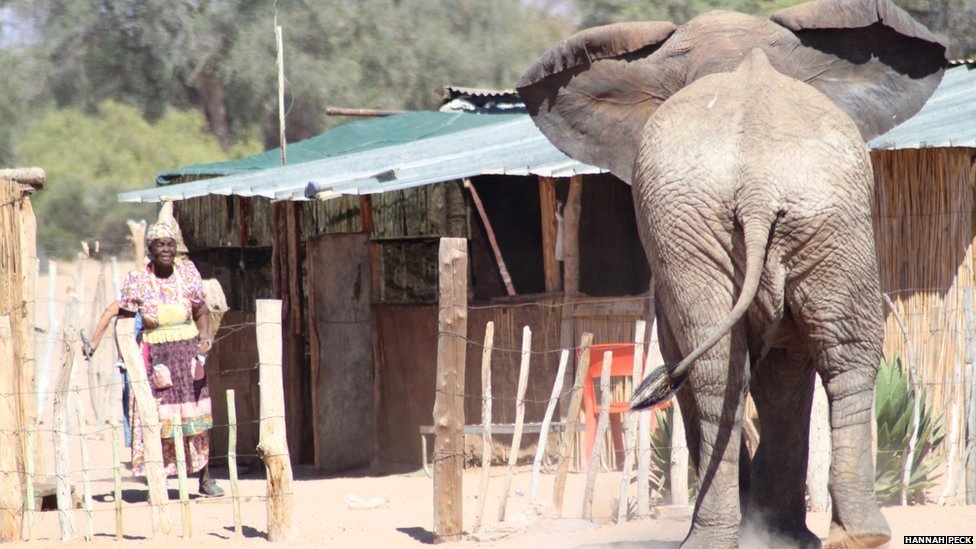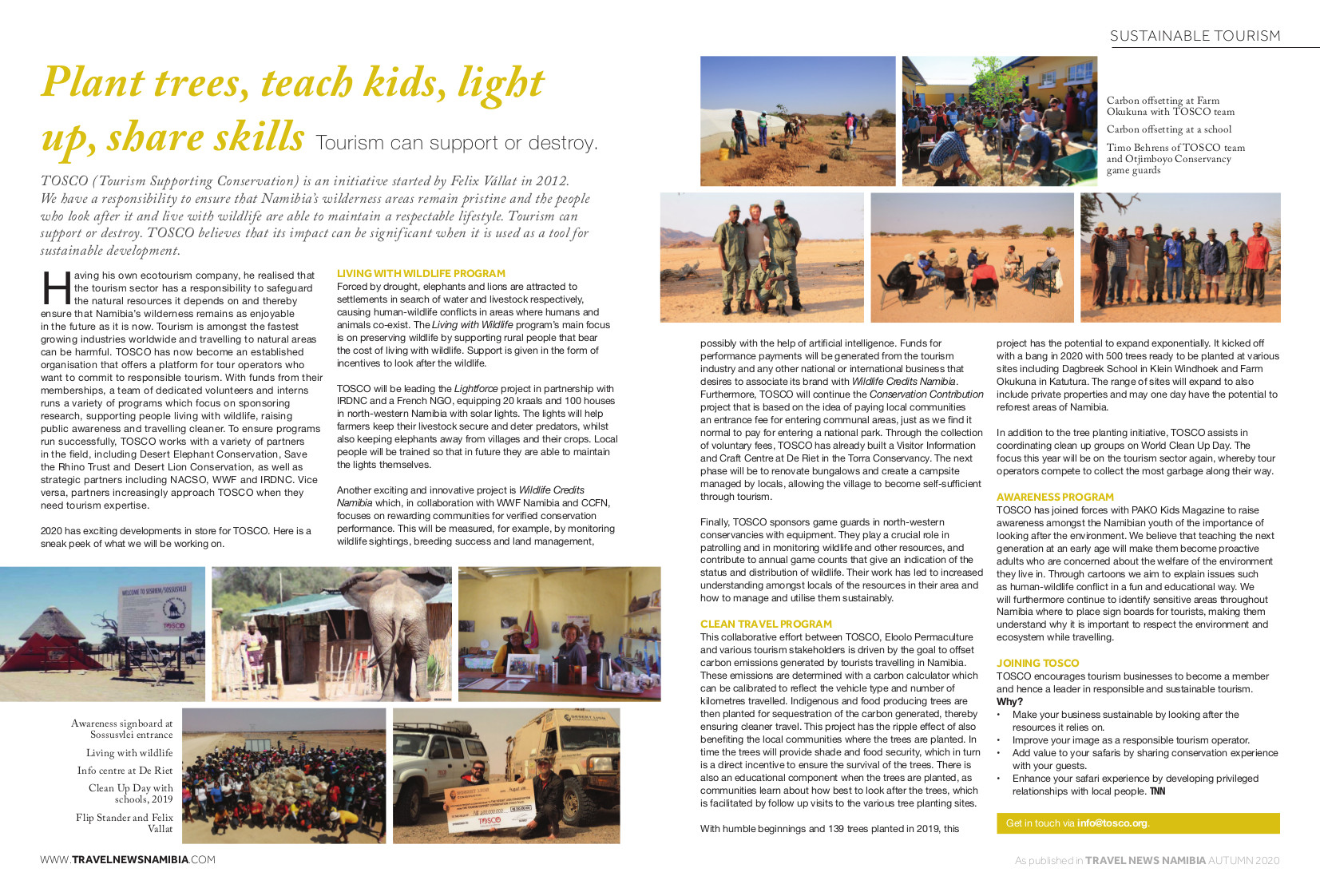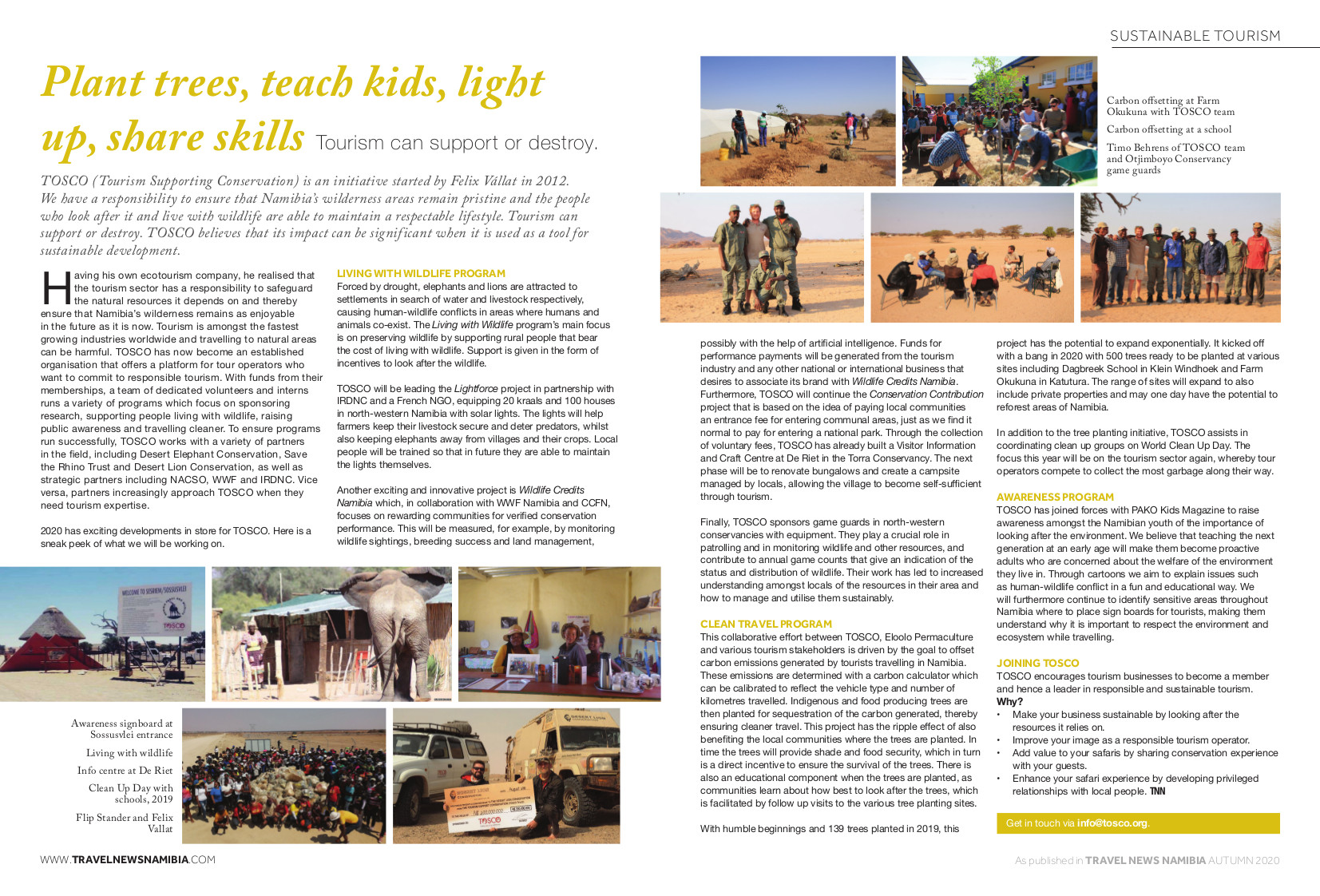TOSCO (Tourism Supporting Conservation) is an initiative started by Felix Vállat in 2012.
We have a responsibility to ensure that Namibia’s wilderness areas remain pristine and the people who look after it and live with wildlife are able to maintain a respectable lifestyle. Tourism can support or destroy. TOSCO believes that its impact can be signif icant when it is used as a tool for sustainable development.
Having his own ecotourism company, he realised that the tourism sector has a responsibility to safeguard the natural resources it depends on and thereby ensure that Namibia’s wilderness remains as enjoyable in the future as it is now. Tourism is amongst the fastest growing industries worldwide and travelling to natural areas can be harmful. TOSCO has now become an established organisation that offers a platform for tour operators who want to commit to responsible tourism. With funds from their memberships, a team of dedicated volunteers and interns runs a variety of programs which focus on sponsoring research, supporting people living with wildlife, raising public awareness and travelling cleaner. To ensure programs run successfully, TOSCO works with a variety of partners in the field, including Desert Elephant Conservation, Save the Rhino Trust and Desert Lion Conservation, as well as strategic partners including NACSO, WWF and IRDNC. Vice versa, partners increasingly approach TOSCO when they need tourism expertise.
2020 has exciting developments in store for TOSCO. Here is a sneak peek of what we will be working on.
LIVING WITH WILDLIFE PROGRAM
Forced by drought, elephants and lions are attracted to settlements in search of water and livestock respectively, causing human-wildlife conflicts in areas where humans and animals co-exist. The Living with Wildlife program’s main focus is on preserving wildlife by supporting rural people that bear the cost of living with wildlife. Support is given in the form of incentives to look after the wildlife.
TOSCO will be leading the Lightforce project in partnership with IRDNC and a French NGO, equipping 20 kraals and 100 houses in north-western Namibia with solar lights. The lights will help farmers keep their livestock secure and deter predators, whilst also keeping elephants away from villages and their crops. Local people will be trained so that in future they are able to maintain the lights themselves.

Clean Up Day with schools, 2019 
Awareness signboard at Sossusvlei entrance 
Info centre at De Riet 
Living with wildlife
Another exciting and innovative project is Wildlife Credits Namibia which, in collaboration with WWF Namibia and CCFN, focuses on rewarding communities for verified conservation performance. This will be measured, for example, by monitoring wildlife sightings, breeding success and land management, possibly with the help of artificial intelligence. Funds for performance payments will be generated from the tourism industry and any other national or international business that desires to associate its brand with Wildlife Credits Namibia. Furthermore, TOSCO will continue the Conservation Contribution project that is based on the idea of paying local communities an entrance fee for entering communal areas, just as we find it normal to pay for entering a national park. Through the collection of voluntary fees, TOSCO has already built a Visitor Information and Craft Centre at De Riet in the Torra Conservancy. The next phase will be to renovate bungalows and create a campsite managed by locals, allowing the village to become self-sufficient through tourism.
Finally, TOSCO sponsors game guards in north-western conservancies with equipment. They play a crucial role in patrolling and in monitoring wildlife and other resources, and contribute to annual game counts that give an indication of the status and distribution of wildlife. Their work has led to increased understanding amongst locals of the resources in their area and how to manage and utilise them sustainably.

Otjimboyo Conservancy game guards 
Carbon offsetting at a school 
Timo Behrens of TOSCO team and Otjimboyo Conservancy game guards 
Timo Behrens of TOSCO team and Otjimboyo Conservancy game guards
CLEAN TRAVEL PROGRAM
This collaborative effort between TOSCO, Eloolo Permaculture and various tourism stakeholders is driven by the goal to offset carbon emissions generated by tourists travelling in Namibia. These emissions are determined with a carbon calculator which can be calibrated to reflect the vehicle type and number of kilometres travelled. Indigenous and food producing trees are then planted for sequestration of the carbon generated, thereby ensuring cleaner travel. This project has the ripple effect of also benefiting the local communities where the trees are planted. In time the trees will provide shade and food security, which in turn is a direct incentive to ensure the survival of the trees. There is also an educational component when the trees are planted, as communities learn about how best to look after the trees, which is facilitated by follow up visits to the various tree planting sites.
With humble beginnings and 139 trees planted in 2019, this project has the potential to expand exponentially. It kicked off with a bang in 2020 with 500 trees ready to be planted at various sites including Dagbreek School in Klein Windhoek and Farm Okukuna in Katutura. The range of sites will expand to also include private properties and may one day have the potential to reforest areas of Namibia.
In addition to the tree planting initiative, TOSCO assists in coordinating clean up groups on World Clean Up Day. The focus this year will be on the tourism sector again, whereby tour operators compete to collect the most garbage along their way.
AWARENESS PROGRAM
TOSCO has joined forces with PAKO Kids Magazine to raise awareness amongst the Namibian youth of the importance of looking after the environment. We believe that teaching the next generation at an early age will make them become proactive adults who are concerned about the welfare of the environment they live in. Through cartoons we aim to explain issues such as human-wildlife conflict in a fun and educational way. We will furthermore continue to identify sensitive areas throughout Namibia where to place sign boards for tourists, making them understand why it is important to respect the environment and ecosystem while travelling.
JOINING TOSCO
TOSCO encourages tourism businesses to become a member and hence a leader in responsible and sustainable tourism. Why?
- Make your business sustainable by looking after the resources it relies on.
- Improve your image as a responsible tourism operator.
- Improve your image as a responsible tourism operator.
- Add value to your safaris by sharing conservation experience with your guests.
- Enhance your safari experience by developing privileged relationships with local people. TNN
Get in touch via info@tosco.org
Article published on Travel News Namibia 2020-3 TNN Autumn Volume 28 No 3 TOSCO

